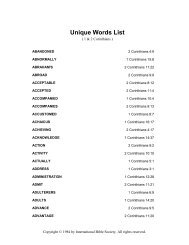FREE METHODIST YOUTH - Bible Quizzing - Study Tips & Resources
FREE METHODIST YOUTH - Bible Quizzing - Study Tips & Resources
FREE METHODIST YOUTH - Bible Quizzing - Study Tips & Resources
You also want an ePaper? Increase the reach of your titles
YUMPU automatically turns print PDFs into web optimized ePapers that Google loves.
compete in the Senior Team division. A young teen team with a 9th grader may have the option of quizzing in senior teencompetition.(4) A minimum of two quizzers is required for a team to compete in any level of “team” competition.C-4: Types of Tournaments(5) Tournaments sponsored by a Conference or Regional <strong>Bible</strong> Quiz Director shall be considered “official” conferenceand/or regional tournaments, and are entitled to use Official Tournament Questions available from the denominationalQuiz Director. Tournaments organized by coaches or other local quiz leaders without the sponsorship of the Conferenceor Regional <strong>Bible</strong> Quiz Director (D-7 and D-8) shall be considered “unofficial” and must use questions written by the participatingcoaches or by the Tournament Coordinator. (D-6)(6) Round Robin tournaments are those in which each team competes against all other participating teams (or asmany as possible within the limitations of the schedule). In this type of competition, the team with the best win / loss recordtakes 1st place; the team with the second-best record takes 2nd place; etc. (For ties in record, see C-5.)(7) Double Elimination tournaments start by having each team play an opponent, with winners proceeding to onebracket and losers to another bracket. Teams are eliminated from the competition with two losses, with the first loss placingthe team in the losers’ bracket. Unless defeated twice by the winner of the losers’ bracket, the winner of the winners’bracket takes 1st place; the winner of the losers’ bracket 2nd place; their final opponent 3rd place; and so on. (For moreinformation on tournament types and how to set up, refer to the <strong>Bible</strong> <strong>Quizzing</strong> Handbook available as a free downloadfrom the <strong>Bible</strong> <strong>Quizzing</strong> web site.)(8) Combination Tournaments are those which start with a Round Robin tournament to “seed” teams and end upwith a double elimination tournament (where teams with the best records are placed so that they will not have to playeach other until the final rounds) to decide winners. When time is available to run them, combination tournaments arepopular because of greater team participation (Round Robin) and accurate determination of winners (Double Elimination).C-5: Deciding Tournament Winners(9) If two or more teams tie in win/loss record for a Round Robin Tournament and have no opportunity for a playoff,the deciding factor will be who won the head-to-head competition (when the teams played each other). If the teamsdid not play each other, or in the case of a circular tie where team A beat team B, team B beat team C, and team C beatteam A, the next deciding factor will be “average points per quiz” for each team. Average points are to be used in determiningthe first place team in such a three-way tie. Second and third places are then determined by head-to-head competitionresults. In the rare case where teams are tied in all three of these areas, there will be no alternative but to leave thetie or hold a play-off.C-6: Forfeit of Quiz(10) Any team failing to appear within ten minutes after the announced beginning time (except for completely unavoidablecircumstances) will automatically “forfeit” the round. Acceptable lateness might include a prior quiz runninglate, a mix-up on time and place where the participating team is not at fault, a transportation breakdown with the lateteam still arriving within a reasonable period of time, etc. The tournament coordinator (upon notification from the quizmaster)shall rule on the validity of the team’s reason for lateness. His decision is final. (For “Forfeit of Question,” see ForfeitJumping - F-4.)C-7: Time Outs(11) Two sixty second time-outs per team may be requested by coaches or captains during a quiz, and granted by thequizmaster. Time-outs may be called only after a question is closed and before the next question is started. As a courtesyto both teams, when an appeal is being considered and when a team asks for a time-out, the quizmaster is encouraged toask both teams if they are ready for the question to be closed before allowing the time-out. A time-out is not declaredwhen a coach requests it, but rather when the quizmaster grants it.No team time-outs are allowed after beginning the 13th question, nor after the start of Overtime (C-9). An officialtime-out may be called by the quizmaster at any time, even when a question is still “open.” He may need this time tocheck for equipment failure, seek advice, or do anything else necessary for the fair awarding of points on any given question.(See Timekeeper, D-4.)





